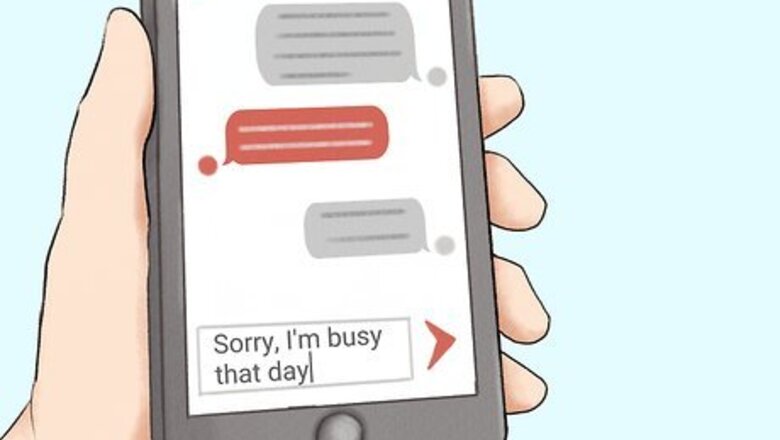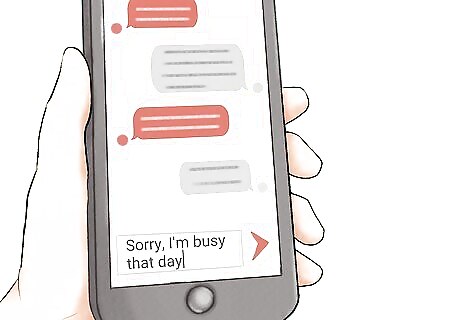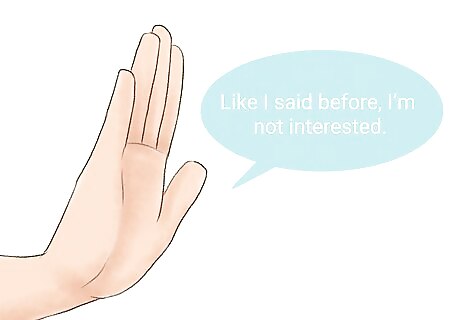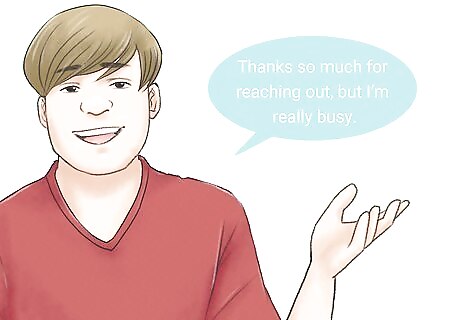
views
- Offer a reasonable excuse when saying no to plans or invitations, like, "Sorry, I'm busy that day," or, "No, thank you. I'm not feeling up to it."
- Stand your ground when someone continues to ask for something. Say, "My answer isn't changing, but thank you for asking."
- Offer an alternative or a compromise, if you feel comfortable doing so. Ask to reschedule a plan, or tell the person what you are willing to do instead.
Say it politely in simple terms.

Refusing someone doesn’t have to be complicated or rude. In fact, experts suggest keeping your explanation short, sweet, and to the point. When you give a long, drawn-out explanation about why you can’t do something, the requester may keep prodding you. Give a short, brief, polite explanation instead. You might say, “Sorry, I’m busy that day” or “I’d love to help, but my schedule’s tied up at the moment.” You could also say, “No, I’ve got a lot on my plate this weekend” or “Sorry, that doesn’t really interest me.” It can be really hard to say no at first, especially if you’re worried about disappointing or upsetting the other person. Try to remind yourself that your time is just as valuable as theirs, and that no one is automatically entitled to your energy and free time.
Speak firmly.

You can be assertive and polite at the same time. Choose firm, definitive words when you say no, so there’s no room for extra negotiation. With any luck, the requester will leave you alone and move onto someone else. If a co-worker asks you for help, you might say, “I’m sorry, I can’t help you at the moment. If I get any free time, I’ll be sure to let you know” or “I’ve worked double shifts for the past 3 days, and I don’t have the energy to cover for anyone right now.”
Stand your ground.

Some people don’t always take “no” for an answer. If your first refusal doesn’t get the message across, stand strong. Tell them again that you can’t meet their request, and that you aren’t going to change your mind. It’s okay to be a little pushy, especially if the requester isn’t backing down. Remember—you aren’t obligated to help, and you aren’t a bad person for saying no. If a pesky salesperson won’t get off your back, you might respond, “Like I said before, I’m not interested” or “I know that you don’t give up easily, but I’m not changing my mind on this.”
Remind the requester that it’s nothing personal.

Saying no doesn’t mean you’re rejecting the other person. Instead, explain politely that you just don’t have the time or energy to meet their request right now. Depending on the situation, you might offer to lend a hand later, or ask for a rain check on an invitation. If a friend invites you out to eat, you might say, “I’d love to have lunch, but I’m up to my ears in assignments right now. Could we do it some other time?” You could also say, “I appreciate the offer, but I’m really busy.”
Get back to them later if you feel nervous.

There’s no rule saying you have to answer right away. In many cases, a simple “Let me think about it” can buy you a little more time. If you don’t want to meet their request but don’t have an excuse lined up, this is the option for you. Asking for some extra time to think things over is perfectly fine, but try not to take too long. Let the other person know within a few days what your decision is.
Thank the person instead of feeling annoyed.

Try to view their request in a positive light. The fact that they reached out means that they probably think you’re responsible and trustworthy, which is definitely a compliment. Instead of feeling annoyed or obligated, thank them for thinking of you, even if you aren’t able to help out. If some friends or co-workers invite you out for drinks, you might say, “I’m honored that you thought of me, but I’m swamped with work right now” or “Thanks so much for reaching out, but I’m really busy." If a charity representative calls you, you could say, “I really appreciate you thinking of me! I’d love to help, but my schedule is jam-packed.”
Give an excuse for an easy out.

Your time is just as valuable as the requester’s. Don’t view excuses as cop-outs; in fact, this couldn’t be further from the truth. Even if you can’t help the requester, let them know why you can’t. Maybe your schedule is packed, or you just don’t have the energy. Whatever it is, let them know up front—it’s a lot easier to say no when you have an excuse backing you up! If a friend asks you to help them set up some new furniture, you could say, “Sorry, I can’t help you. I have a dentist appointment that day” or “I’m meeting my sister for lunch this Saturday, so I won’t be around then.”
Offer a compromise instead of refusing.

Compromises are a nice middle ground for both you and the other person. If you would genuinely like to help out, offer to do part of the request instead. With a little negotiation, you might find a happy medium. For example, you might suggest a different timeline for the requester. You could say, “I’m busy for the next 2 weeks, but if you’re okay with waiting, I could get it done for you in 3.”
Suggest an alternative so the person still gets the help they need.

See if someone else can help out. Chances are, you aren’t the only person out there who can lend the requester a hand. After saying no, suggest someone else who might be able to help in the meantime. If your schedule is too busy to help a fellow co-worker, you could say, “I’m really busy this afternoon, but Kelly might be able to help you out.”
Push back against manipulative tactics.

Some people try to frame their questions so you can’t say no. This can be really frustrating, but it’s not the end of the world, either. A simple “Sorry, I’m not interested” or “No thanks” can go a long way in shutting these people down. For example, a persistent salesperson might ask, “Can I put you down for a $5 or $10 donation?” In this case, you might say, “Sorry, I’m not interested in donating right now.”
Practice in a low-risk environment.

Saying no only gets easier over time. Look for easy, basic opportunities to say no in your daily routine. Maybe your co-worker offers to grab you coffee, or the clerk at a sandwich shop asks if you want tomatoes on your sandwich. Small, simple refusals can help you build your confidence as you work your way up to bigger conversations.




















Comments
0 comment